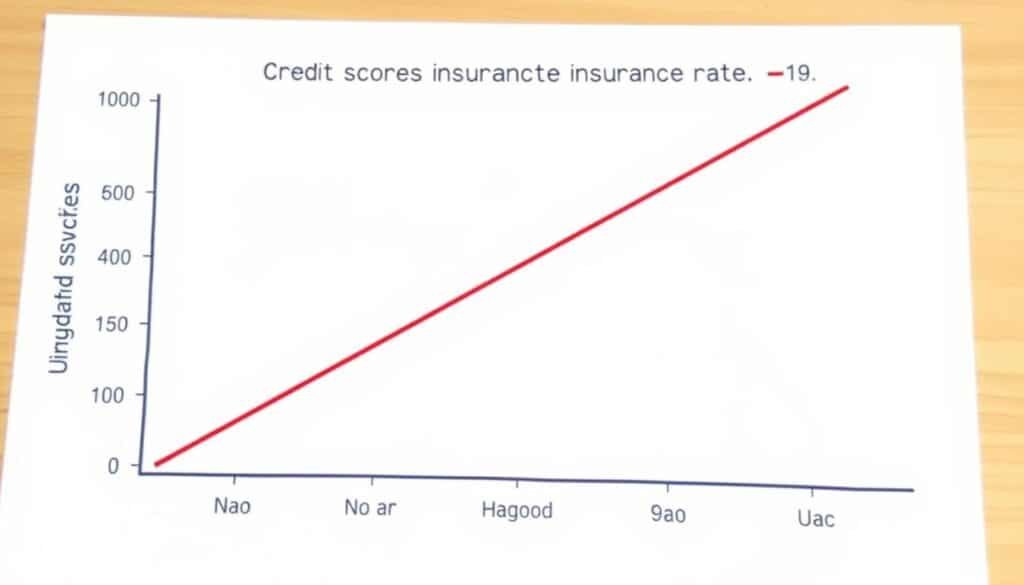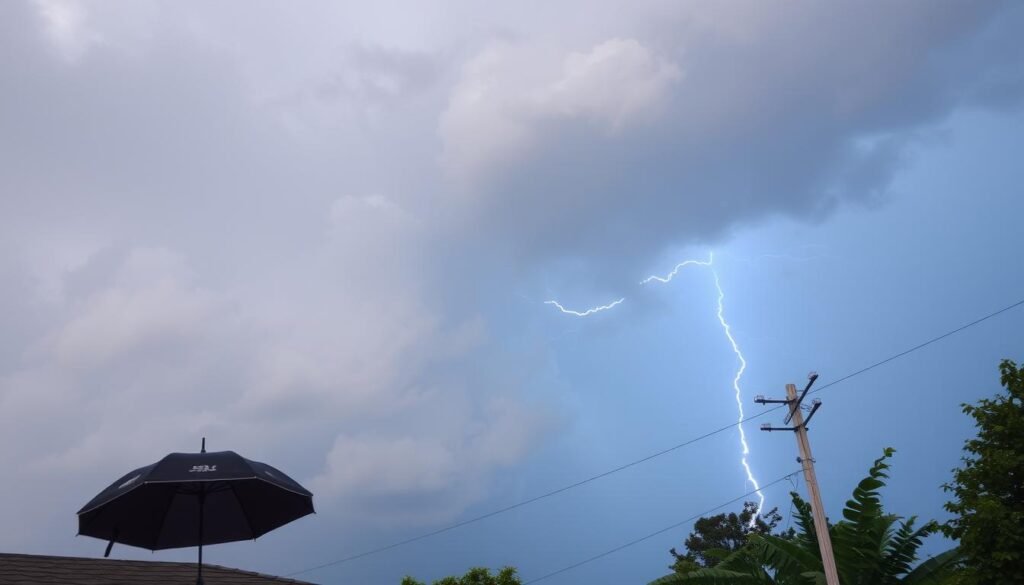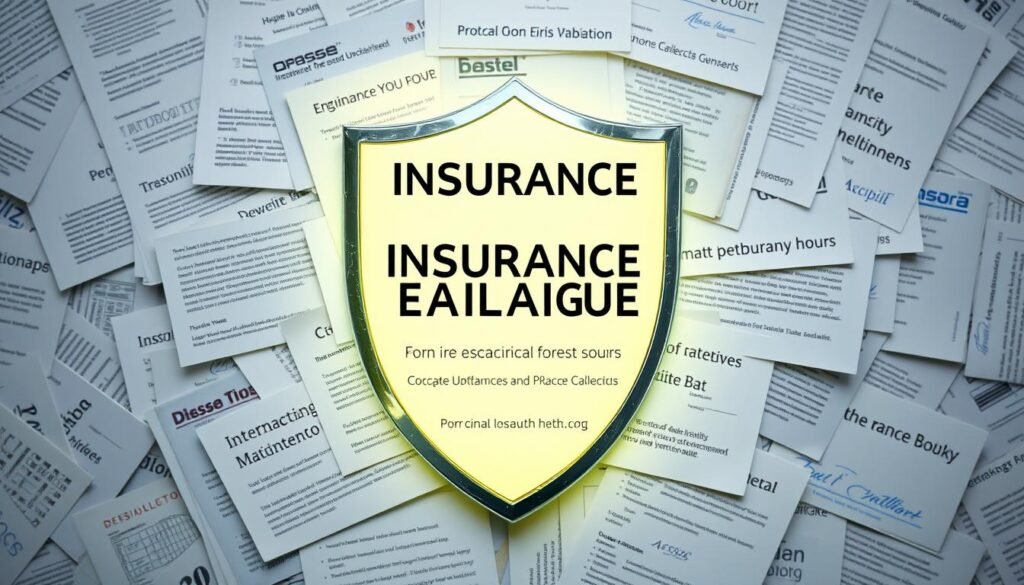Insurance Really Protecting You: Insurance is key to handling life’s surprises. It gives you financial safety and peace of mind. You’ll be covered if something unexpected happens, like an accident or illness. But, how do you know your insurance is really looking out for you?
In this article, we’ll dive into insurance. We’ll look at the various types of coverage, what affects your rates, and how to make sure you’re well-protected. This way, you can be sure your hard-earned money is well-spent.
Key Takeaways
- Insurance provides essential financial protection against unexpected medical costs, accidents, and other life events.
- Understanding the different parts of an insurance policy is crucial to ensuring you’re adequately covered.
- Factors like your driving history, credit score, and location can significantly impact your insurance premiums.
- Shopping around and comparing policies can help you find the best coverage at the most competitive rates.
- Regularly reviewing your insurance needs and adjusting your coverage accordingly is important to maintain optimal protection.
Understanding Insurance Policies
An insurance policy is a legal agreement between the insurance company and the person or business being covered. It details the rights and duties of both sides in case of a claim. Reading your insurance policy ensures it matches your needs and you know what to do if a loss happens.
What is an Insurance Policy?
An insurance contract is a detailed document that outlines the coverage terms. It includes the declaration page, insuring agreement, exclusions, conditions, definitions, endorsements, and riders. Knowing these parts of your insurance policy is key to making sure you have the right coverage.
The Four Basic Parts of an Insurance Contract
- Declaration Page: This part shows who is covered, what risks or property are insured, the policy limits, and the policy period.
- Insuring Agreement: The insuring agreement outlines the main promises of the insurance company and what is covered by the policy.
- Exclusions: Exclusions remove coverage from the Insuring Agreement, like excluded perils or losses.
- Conditions: Conditions set rules or limits on the insurer’s promise to pay or perform.
Understanding an insurance policy‘s parts helps make sure your coverage fits your needs and expectations.
“An insurance policy is a legal contract that outlines the rights, responsibilities, and expectations of both the insurer and the insured in the event of a covered loss or claim.”
The Importance of Health Insurance

Health insurance is key to protecting you from the high costs of medical care. It covers important health benefits that keep you healthy and help with unexpected illnesses or accidents. With health insurance, you get to use preventive services like vaccines and check-ups without paying too much.
Essential Benefits of Health Insurance
Health insurance gives you access to many essential benefits. These include:
- Ambulatory patient services
- Emergency services
- Hospitalization
- Pregnancy, maternity, and newborn care
- Mental health and substance use disorder services
- Prescription drugs
- Rehabilitative and habilitative services and devices
- Laboratory services
- Preventive and wellness services, and chronic disease management
Protecting Against High Medical Costs
Health insurance also shields you from the high costs of medical care. You pay less for care from in-network providers, even before you meet your deductible. This is very helpful if you need a lot of care or face a serious emergency.
Also, if you have a Marketplace plan or other health coverage through the Affordable Care Act from 2018 or later, you won’t have to pay a penalty. This is for people without coverage.
“Health insurance is not just a luxury, but a necessity in today’s world. It provides peace of mind and financial protection when you need it most.”
Auto Insurance: Factors Affecting Premiums

Auto insurance costs can change based on several things. Your age, how long you’ve been driving, and your driving history matter a lot. Also, the type and performance of your car can change your insurance rates.
Driver Profile and Driving History
Insurance companies look at your driver profile to see how risky you are. Your age, how long you’ve been driving, and your driving record all play a part. Younger, less experienced drivers and those with a bad driving record might pay more because they’re seen as riskier.
Car Type and Performance
The kind of car you drive affects your insurance rates too. Cars that cost more, have powerful engines, and are safer tend to be pricier to insure. This is because they might be more expensive to fix or replace if there’s an accident. On the other hand, cars that are less likely to get into accidents might get cheaper insurance.
| Factors Affecting Auto Insurance Premiums | Impact on Rates |
|---|---|
| Driver Profile (Age, Experience, Driving History) | Higher risk = Higher Premiums |
| Car Type (Cost, Performance, Safety Features) | Higher Cost = Higher Premiums |
| Credit History | Poorer Credit = Higher Premiums |
| Claim History | More Claims = Higher Premiums |
Knowing what affects auto insurance rates can help you make better choices. By thinking about these factors, you can pick a policy that fits your needs and budget.
Credit History and Insurance Rates

Your credit history affects your insurance rates. A leading credit reporting agency, Experian, says most states let insurers use your credit score to set premiums.
Insurers think your credit history shows how likely you are to make claims. They believe people with good credit history and credit scores are less likely to file claims. This makes them a lower risk for insurers.
Improving your credit score can help you get better insurance rates. Showing you manage your finances well tells insurers you’re a reliable customer. This can lead to lower underwriting costs and premiums.
| Credit Score Range | Impact on Insurance Rates |
|---|---|
| 800-850 | Lowest insurance rates |
| 700-799 | Moderate insurance rates |
| 600-699 | Higher insurance rates |
| 500-599 | Highest insurance rates |
“Improving your credit score can be a valuable strategy for obtaining better insurance rates.”
Knowing how credit history, credit score, and insurance rates are linked helps you manage your finances better. This can lead to better insurance coverage and prices.
External Conditions and Insurance Rates

External factors greatly affect your insurance rates. Weather and traffic conditions can change how much you pay for insurance. These factors can lead to changes in your premiums.
Weather Patterns and Their Impact
Natural disasters and severe weather can damage homes and property, causing more claims. Areas often hit by hurricanes, floods, or hail may pay more for insurance. This is because the risk of damage is higher.
Insurance companies look at past weather data to guess future claims. They use this to set prices.
Traffic Conditions and Accident Rates
How often accidents happen in your area can raise your insurance rates. If there are a lot of collisions, your insurance might cost more. Companies watch traffic to set the right prices for you.
Knowing how external factors affect your insurance can help you make better choices. Being informed and proactive can make sure your insurance covers you well, even in tough conditions.
Insurance Really Protecting You

It’s key to check your insurance policies closely to make sure they protect you well. Hidden risks, gaps in coverage, and policy limits can leave you open to financial danger. Knowing your coverage details and managing risks well can make you feel secure that your insurance covers you.
To see if your insurance covers you, think about these points:
- Coverage Gaps: Look at your policies to find any gaps in coverage that could risk your finances. Make sure your insurance covers the risks you’re facing.
- Policy Limits: Check your coverage limits to make sure they’re enough for potential losses or liabilities. Change your policies if needed to get enough protection.
- Hidden Risks: Know about any hidden risks or exclusions in your policies that could leave you uncovered. Read the fine print and talk to your insurance provider to understand what you’re covered for.
By reviewing your insurance policies and understanding your coverage, you can act to reduce financial risks. This ensures your insurance is really looking out for you. Managing risks well is crucial for making sure your insurance gives you the protection you need.
“Insurance is not just a piece of paper, it’s a promise to protect you in times of need. Make sure that promise is being kept.”
Life Insurance Coverage

Life insurance is key to protecting your loved ones. It offers financial security after you’re gone. It covers funeral costs, debts, and your family’s living expenses. Choosing between term and whole life insurance can be tough, but knowing the differences helps.
Term Life vs. Whole Life Insurance
Term life insurance covers you for a set time. If you die during this time, your family gets a death benefit. It’s cheaper, making it great for those on a budget or needing coverage for a short time.
Whole life insurance protects you for life, with a death benefit paid out anytime. It also builds cash value, which you can borrow or use for premiums. Though pricier than term life, it offers lasting financial protection for your beneficiaries and yourself.
When picking between term and whole life, think about your needs, budget, and goals. A financial advisor can guide you to the right life insurance choice for your family’s future.
Homeowners Insurance

Your house is probably your biggest financial investment. Homeowners insurance helps protect this important asset. It covers many risks. Knowing what your policy covers and excludes ensures you have the right protection.
Covered Perils: Safeguarding Against Damages
A typical homeowners insurance policy covers damages from fire, wind, hail, theft, and vandalism. It covers your home and your stuff inside. If something happens, your policy can pay for repairs or replacements. This protects you from property damage and financial loss.
Exclusions: Understanding the Limitations
Even with homeowners insurance, some things aren’t covered. Natural disasters like floods and earthquakes are often not included. You might need extra coverage for these risks.
Looking over your homeowners insurance policy helps spot any coverage gaps. This way, you can choose the right protection for your home and liability. Knowing what’s covered and excluded gives you peace of mind.
Liability Insurance

Liability insurance is a key safety net that can prevent financial disaster. It covers you if you’re legally to blame for someone else’s injuries or damage to their property. If an accident or lawsuit happens, this insurance can pay for medical bills, legal fees, and other costs.
It’s vital to have enough liability insurance to protect your savings, investments, and home. Without it, you could lose everything to legal costs. This risk is too great to ignore.
The Benefits of Liability Insurance
- Property Damage Coverage: This insurance can pay for repairs or replacements if you damage someone else’s property.
- Bodily Injury Protection: If you’re at fault for someone’s injuries, it covers their medical bills and other costs.
- Legal Protection: It provides legal help and pays for your defense in a lawsuit.
- Financial Liability Coverage: If a big judgment is made, this insurance can save your personal assets from being used to pay it off.
| Type of Liability Insurance | Coverage | Typical Limits |
|---|---|---|
| Auto Liability | Covers property damage and bodily injury you cause in a car accident | $25,000/$50,000/$25,000 (per person/per accident/property damage) |
| Homeowners Liability | Covers injuries or property damage on your property | $300,000 to $500,000 |
| Personal Umbrella | Offers extra liability coverage beyond your other policies | $1 million to $5 million |
Choosing the right liability insurance means you’re ready for unexpected events. It’s a smart investment for your peace of mind and financial safety.
Disability Insurance

Disability insurance is key to having a safety net if you can’t work due to illness or injury. It helps replace your income and covers living costs while you recover. This ensures your family’s financial security during tough times.
It’s vital to know the types of disability insurance out there. You can choose from short-term and long-term coverage. Short-term policies last 3-6 months, while long-term ones can cover years or until you retire.
| Feature | Short-Term Disability Insurance | Long-Term Disability Insurance |
|---|---|---|
| Benefit Period | 3-6 months | Several years or until retirement |
| Replacement Income | 40-60% of your income | 50-60% of your income |
| Waiting Period | 0-14 days | 90-180 days |
Disability insurance is a must-have for financial protection if you can’t work due to illness or injury. It replaces your income, keeping your family’s lifestyle intact and covering living costs during recovery. Whether you pick short-term or long-term, it’s a big step towards income protection and financial security.
“Disability insurance is the foundation of a solid financial plan. It can provide the financial stability and peace of mind you need when dealing with the unexpected.”
Shopping for the Right Insurance
Finding the right insurance is key to protecting your money. Whether it’s health, auto, or life insurance, compare policies and rates from different companies. This ensures you get the best coverage for your needs.
Comparing Policies and Rates
First, think about what coverage you need. Consider the type of coverage, policy limits, and what deductibles and premiums you can afford. Then, get quotes from several companies to see what they offer. Look for discounts like bundling policies or having a clean driving record.
- Compare coverage types and limits from different companies
- Look at deductibles and premiums to find a good balance
- Check for discounts to save on your insurance costs
Shopping around and comparing options helps you find the right policy. It protects your finances and gives you peace of mind.
| Insurance Company | Coverage Type | Deductible | Premium | Discounts |
|---|---|---|---|---|
| ABC Insurance | Health | $500 | $200/month | 10% for employer-sponsored plan |
| XYZ Insurance | Auto | $250 | $150/month | 5% for good driving record |
| LMN Insurance | Life | N/A | $50/month | 15% for non-smokers |
The secret to finding the right insurance is to shop around, compare, and choose what fits your needs and budget.
Also Read : The Process Of Applying For Life Insurance: A Step-by-step Guide
Conclusion
Ensuring your insurance protection means checking your policies closely. You need to know what’s covered and what’s not. Also, being proactive with risk management helps a lot.
Shopping for the right insurance and understanding your coverage gives you peace of mind. You’ll know your loved ones are safe, no matter what happens.
Choosing the right insurance is key to your financial security. Look at your needs, compare policies, and read the details carefully. This way, you can make smart choices for your situation.
Having the right insurance is a big part of managing risks. By staying informed about your coverage, you and your family will be ready for the future. This gives you peace of mind.
FAQs
Q: What is the right type of insurance for protecting my home?
A: The right type of insurance for protecting your home is typically home insurance, which covers damage to your property and personal belongings. It’s important to evaluate your specific needs and the types of insurance policies available to ensure adequate coverage.
Q: How can I buy insurance that effectively covers financial risks?
A: To buy insurance that effectively covers financial risks, assess your unique situation and consult with an insurance agent. They can help you identify the necessary types of insurance policies, such as comprehensive insurance or specific coverage for your mortgage, to safeguard against potential losses.
Q: What are the different types of insurance policies available?
A: There are many types of insurance policies available, including home insurance, car insurance, health insurance, and life insurance. Each type of insurance has its own coverage options and requirements, so it’s essential to understand the specifics of each to find the best fit for your needs.
Q: What does home insurance typically cover?
A: Home insurance typically covers damage to your home and personal belongings due to events such as fire, theft, or natural disasters. It may also provide liability coverage in case someone is injured on your property, helping to protect against financial risks.
Q: How does the amount of insurance affect my mortgage?
A: The amount of insurance you carry on your home can impact your mortgage lender’s requirements. Lenders often require you to carry a certain amount of home insurance to protect their investment, ensuring that funds are available to repair or replace your home in case of damage.
Q: What happens if I am injured in an accident and don’t have insurance?
A: If you are injured in an accident and do not have insurance, you may be required to pay out of pocket for your medical expenses. This can lead to significant financial strain, highlighting the importance of having the right type of insurance to cover unexpected incidents.
Q: Are there any insurance options available for those eligible for Medicaid?
A: Yes, individuals eligible for Medicaid may have access to additional coverage options under the federal affordable care act. This can help cover various medical expenses, including copays and other out-of-pocket costs, ensuring comprehensive care is available.
Q: What should I consider when choosing a type of life insurance?
A: When choosing a type of life insurance, consider factors such as your financial obligations, the amount of insurance you need, and your long-term goals. Options include term life insurance and whole life insurance, each offering different benefits and coverage lengths.
Q: How do I determine if I need comprehensive insurance for my vehicle?
A: To determine if you need comprehensive insurance for your vehicle, evaluate the value of your car, your financial situation, and your risk tolerance. Comprehensive insurance covers damage to your car from non-collision incidents, which can be beneficial depending on your circumstances.
Source Links
- https://www.healthcare.gov/why-coverage-is-important/coverage-protects-you/
- https://doi.sc.gov/957/Understanding-Your-Insurance-Policy
- https://www.consumerreports.org/money/car-insurance/buying-guide/?srsltid=AfmBOorEysFQQCdsHzAsC6z-VdYAM3QUpXY5J3hqeH2snGihouiEXcPg






